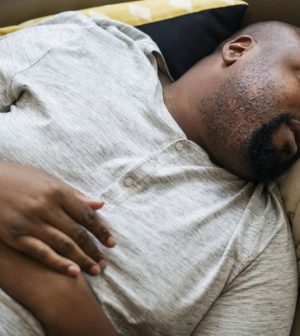- Are You Making This Expensive Thermostat Error This Winter?
- Recognizing the Signs of Hypothyroidism
- 10 Strategies to Overcome Insomnia
- Could Artificial Sweeteners Be Aging the Brain Faster?
- Techniques for Soothing Your Nervous System
- Does the Water in Your House Smell Funny? Here’s Why
- Can a Daily Dose of Apple Cider Vinegar Actually Aid Weight Loss?
- 6 Health Beverages That Can Actually Spike Your Blood Sugar
- Treatment Options for Social Anxiety Disorder
- Understanding the Connection Between Anxiety and Depression
Getting the COVID Vaccine? A Good Night’s Sleep Will Help

Want to get the most out of your COVID-19 vaccine? Make sure you get some good rest before you get your shot, sleep experts say.
That’s because adequate sleep is an important factor in a strong immune system.
“As COVID-19 vaccines are being distributed, it is of utmost importance that patients continue to prioritize their sleep to maintain optimal health,” American Academy of Sleep Medicine (AASM) president Dr. Kannan Ramar said in an academy news release. “Getting sufficient, high-quality sleep on a regular basis strengthens your body’s immune system and optimizes your response to a vaccine.”
Several studies have found an association between sleep and vaccination response. For example, a 2020 study in the International Journal of Behavioral Medicine found that flu vaccines appear to be more effective in people who get a sufficient amount of sleep during the two nights prior to receiving the shot. Other studies have reported similar findings about patients’ response to vaccines for hepatitis A and hepatitis B.
Dr. Khurshid Khurshid is director of the UMMHC/UMMS Center for Neuromodulation at the University of Massachusetts Medical School, in Westborough, Mass. He said, “The role of sleep in boosting innate and acquired immune response is significant. All people, particularly health workers, should be aware of the immunity-boosting effects of sleep. Studies have shown that normal sleep after vaccination strengthens the immune response against an invading antigen, and this immunity-boosting effect of sleep is clinically significant.”
So, Khurshid added in the news release, “A good night’s sleep before and after vaccination could be very advantageous.”
Most adults should sleep at least seven hours a night, but the COVID-19 pandemic has harmed many Americans’ sleep, a recent AASM survey found.
One-third of respondents said their sleep quality has been affected, 30% have had changes in their ability to fall asleep, and 29% reported an impact on their nightly amount of sleep.
The AASM offered tips for getting a good night’s sleep:
- Establish a bedtime and morning routine. Use the bedroom only for sleeping, not watching TV or reading. Keep your bedroom quiet, dark and a bit cool.
- Restrict blue light exposure before bed by turning off your TV and other electronic devices 30 minutes to an hour before bedtime. Silence notifications and charge your devices away from your bed so you’re not tempted to look at social media or news alerts.
- Limit alcohol, caffeine and large meals before bedtime. If you’re hungry after dinner, limit yourself to small, sugar-free and easily digestible snacks to avoid disrupting sleep.
More information
The U.S. Centers for Disease Control and Prevention has more on COVID-19 vaccines.
SOURCE: American Academy of Sleep Medicine, news release
Source: HealthDay
Copyright © 2026 HealthDay. All rights reserved.










